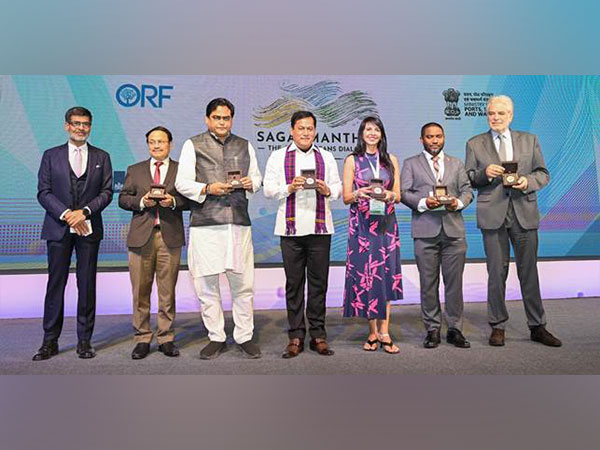The Great Oceans Dialogue, South Asia’s largest Maritime Thought Leadership summit, began in Delhi on Monday.
Sagarmanthan is a two day event organised by MoPSW in collaboration with Observer Research Foundation.
The inaugural session was addressed by the Union Minister of Ports, Shipping (MoPSW) Sarbananda Sonowal; Minister of Maritime Affairs and Insular Policy, Greece, Christos Stylianides; Minister of State for Fisheries and Ocean Resources, Maldives, Dr Amzath Ahmed the National Representative for the Province of Rio Negro, Argentina, Maria Lorena Villaverde; MoPSW Secretary, TK Ramachandran along with the President, Observer Research Foundation (ORF), Samir Saran with the session attended by representatives from 61 countries and hundreds of delegates from the maritime sector.
“The initiative brings together global policymakers, maritime experts, industry leaders, and scholars to deliberate on advancing sustainable and innovative maritime practices,” read a statement by the PSW ministry.
Addressing the inaugural session, Union Minister Sarbananda Sonowal said, “India’s Maritime Vision 2047 is a roadmap to transform the maritime sector by fostering sustainability, enhancing connectivity, and leveraging technology. Under the visionary leadership of Prime Minister Narendra Modi our ministry through initiatives like Sagarmala and the Maritime Amrit Kaal Vision is aiming at making India a leader in global maritime trade, achieving our goal of Viksit Bharat by 2047.”
He further highlighted that the government aims to invest Rs 80 lakh crores to “enhance port capacity, shipping, ship building inland waterways,” and mentioned various megaport projects like Vizhinjam International Seaport in Kerala, new mega ports at Vadhavan in Maharashtra, and Galathea Bay in Nicobar.
“By 2047, India targets a port handling capacity of 10,000 million metric tons per annum, leveraging strategic trade routes through initiatives like the India-Middle East-Europe Economic Corridor (IMEEC) and the International North-South Transport Corridor. Reviving its shipbuilding legacy, India is constructing the National Maritime Heritage Complex at Lothal while advancing clean-fuel shipbuilding to meet future sustainability goals,” the minister said.
Setting the context for the mega deliberations and discussion, minister Sonowal further added, “Recognising India’s maritime potential and its significance for economic growth, our government has implemented crucial policy measures for the ‘Blue and Ocean-based Economy’ over the last decade. Our participation in initiatives like the India-Middle East-Europe Economic Corridor (IMEEC) and the International North-South Transport Corridor underscores our commitment to strengthening global trade partnerships.”
Greece’s Minister of Maritime Affairs and Insular Policy, Christos Stylianides also addressed the event, talking about maintaining a stable regulatory framework and a global level playing field.
“For us policy makers, it is crucial to ensure a stable regulatory framework and a global level playing field for the industry. It is now time to set the foundations for forward-looking and realistic policies which will the current maritime challenges into opportunities. International transport systems with shipping at its core as an integral part, should serve the three pillars of sustainability: the environmental, the social and the economic one. This will be done by optimising efficiency in connectivity, minimising pollution and ensuring resilience across the entire maritime chain. What we need now is collaboration and the ‘Sagarmanthan: The Great Oceans Dialogue’ is a great example in this direction. It is in our hands, in a spirit of partnership, to make this happen,” Greece’s minister said.
The Minister of State Shantanu Thakur also highlighted potential of coastal communities and how global partnerships are needed.
“India’s economic growth is guided by the principle of Vasudhaiva Kutumbakam–‘The World is One Family.’ Our ports and shipping corridors are not just about commerce but about connectivity, collaboration, and care for coastal communities and the environment. The oceans must be a global priority, not just for economic development but for ecological preservation and energy innovation,” Minister Thakur said.
Prime Minister’s Economic Advisory Council (PM-EAC) member Sanjeev Sanyal also spoke at the event, talking about how India should be at the forefront of the maritime sector.
“This should serve as a guiding principle for all of us to strengthen and grow our maritime cluster. Our goal is to position ourselves at the forefront of the maritime sector, and to achieve this, we must draw on the expertise of industry leaders who set benchmarks across various verticals. The seas and oceans, gifts of nature, are abundant with resources, energy, and potential. It is our responsibility to harness them wisely, combining knowledge and skill to achieve sustainable growth,” Sanyal said.
On the sidelines of Sagarmanthan, Union Minister Sonowal participated in a bilateral meeting with the Greece’s Minister of Maritime Affairs and Insular Policy, Christos Stylianides. The two leaders discussed an array of topics and agreed to deepen the maritime relationship between the two countries. Both the leaders agreed to expand trade from the existing US$ 1.94 billion to doubling it by focussing on broadening, increasing, and balancing by 2030.
The two-day forum’s agenda includes sessions on maritime connectivity, sustainable development, technological innovation, and global maritime governance.-ANI


